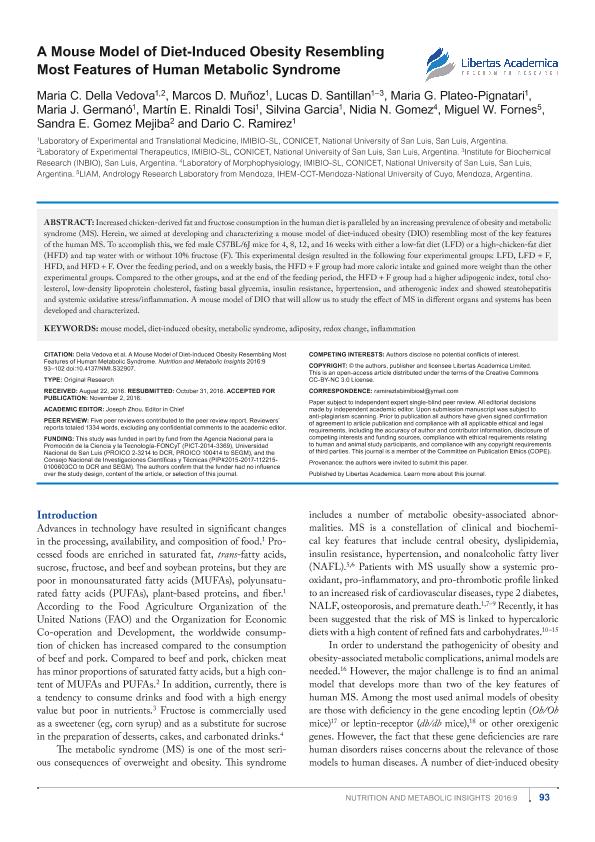Artículo
A mouse model of diet-induced obesity resembling most features of human metabolic syndrome
Della Vedova, Maria Cecilia ; Muñoz, Marcos David
; Muñoz, Marcos David ; Santillán, Lucas Damián
; Santillán, Lucas Damián ; Plateo Pignatari, Maria Gabriela
; Plateo Pignatari, Maria Gabriela ; Germano, Maria Jose
; Germano, Maria Jose ; Rinaldi Tosi, Martin Edgardo
; Rinaldi Tosi, Martin Edgardo ; Garcia, Silvina Edith
; Garcia, Silvina Edith ; Gómez, Nidia; Fornes, Miguel Walter
; Gómez, Nidia; Fornes, Miguel Walter ; Gomez-Mejiba, Sandra Esther
; Gomez-Mejiba, Sandra Esther ; Ramirez, Dario
; Ramirez, Dario
 ; Muñoz, Marcos David
; Muñoz, Marcos David ; Santillán, Lucas Damián
; Santillán, Lucas Damián ; Plateo Pignatari, Maria Gabriela
; Plateo Pignatari, Maria Gabriela ; Germano, Maria Jose
; Germano, Maria Jose ; Rinaldi Tosi, Martin Edgardo
; Rinaldi Tosi, Martin Edgardo ; Garcia, Silvina Edith
; Garcia, Silvina Edith ; Gómez, Nidia; Fornes, Miguel Walter
; Gómez, Nidia; Fornes, Miguel Walter ; Gomez-Mejiba, Sandra Esther
; Gomez-Mejiba, Sandra Esther ; Ramirez, Dario
; Ramirez, Dario
Fecha de publicación:
12/2016
Editorial:
Libertas Academica Ltd.
Revista:
Nutrition and Metabolic Insights
ISSN:
1178-6388
Idioma:
Inglés
Tipo de recurso:
Artículo publicado
Clasificación temática:
Resumen
Increased chicken-derived fat and fructose consumption in the human diet is paralleled by an increasing prevalence of obesity and metabolic syndrome (MS). Herein, we aimed at developing and characterizing a mouse model of diet-induced obesity (DIO) resembling most of the key features of the human MS. To accomplish this, we fed male C57BL/6J mice for 4, 8, 12, and 16 weeks with either a low-fat diet (LFD) or a high-chicken-fat diet (HFD) and tap water with or without 10% fructose (F). This experimental design resulted in the following four experimental groups: LFD, LFD + F, HFD, and HFD + F. Over the feeding period, and on a weekly basis, the HFD + F group had more caloric intake and gained more weight than the other experimental groups. Compared to the other groups, and at the end of the feeding period, the HFD + F group had a higher adipogenic index, total cholesterol, low-density lipoprotein cholesterol, fasting basal glycemia, insulin resistance, hypertension, and atherogenic index and showed steatohepatitis and systemic oxidative stress/inflammation. A mouse model of DIO that will allow us to study the effect of MS in different organs and systems has been developed and characterized.
Archivos asociados
Licencia
Identificadores
Colecciones
Articulos(CCT - PATAGONIA NORTE)
Articulos de CTRO.CIENTIFICO TECNOL.CONICET - PATAGONIA NORTE
Articulos de CTRO.CIENTIFICO TECNOL.CONICET - PATAGONIA NORTE
Articulos(IHEM)
Articulos de INST. HISTOLOGIA Y EMBRIOLOGIA DE MEND DR.M.BURGOS
Articulos de INST. HISTOLOGIA Y EMBRIOLOGIA DE MEND DR.M.BURGOS
Articulos(IMBECU)
Articulos de INST. DE MEDICINA Y BIO. EXP. DE CUYO
Articulos de INST. DE MEDICINA Y BIO. EXP. DE CUYO
Articulos(IMIBIO-SL)
Articulos de INST. MULTIDICIPLINARIO DE INV. BIO. DE SAN LUIS
Articulos de INST. MULTIDICIPLINARIO DE INV. BIO. DE SAN LUIS
Citación
Della Vedova, Maria Cecilia; Muñoz, Marcos David; Santillán, Lucas Damián; Plateo Pignatari, Maria Gabriela; Germano, Maria Jose; et al.; A mouse model of diet-induced obesity resembling most features of human metabolic syndrome; Libertas Academica Ltd.; Nutrition and Metabolic Insights; 9; 12-2016; 93-102
Compartir
Altmétricas



